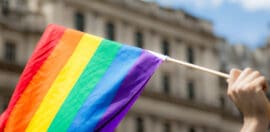More than rainbows: Recognising IDAHOBIT day’s dark history

9 May 2022 at 4:49 pm
While IDAHOBIT day now has a celebratory mood, the journey toward it has been darker and more difficult than many realise, writes Nevena Spirovska.
Many social sector workplaces will be adorned with rainbows on Tuesday 17 May, commemorating the International Day Against Homophobia, Biphobia, Interphobia and Transphobia (IDAHOBIT), which celebrates LGBTQIA+ people worldwide, and raises awareness of the work that’s still needed to combat discrimination. Pride flag-raising ceremonies at local government councils, panel events on the importance of LGBTQIA+ equality and inclusion, film screenings sharing positive deceptions of queer lives and love, and of course, colourful morning teas are all part of the festivities.
Given the very welcome widespread adoption of IDAHOBIT celebrations, it’s easy to forget the day’s origins. On 17 May 1990, the world health organisation officially de-classified homosexuality as a mental disorder. Slow progress, given that the American Psychiatric Association removed homosexuality as a psychiatric condition from the Diagnostic and Statistical Manual of Mental Disorders in 1973.
Despite the enormous legislative battles they’ve fought across the country over decades, Australia’s LGBTQIA+ communities have made tremendous social progress. It’s now difficult to believe – but when Kylie Minogue first performed at Sydney Mardi Gras in 1994, homosexuality was still a crime in a part of Australia. Decriminalisation in Tasmania was the result of a long and difficult campaign. The Homosexual Law Reform Group led a wave of homosexual law reform in Tasmania between 1976 and 1979, but it was short-lived and ultimately unsuccessful. The Tasmanian Gay Law Reform Group was formed in 1988, and they launched a 10-year campaign to repeal the laws, which eventually led all the way to Australia’s High Court, and the United Nations. It wasn’t until 1997 that the Tasmanian queer community and the The Homosexual Law Reform Group could finally celebrate the success of their tireless and dedicated hard work.
As recently as 2016, Queensland had unequal age of consent laws for anal intercourse. In Western Australia and New South Wales, the age of consent for same-gender intercourse was unequal until the 2000s. Shockingly, the South Australian Parliament only two years ago passed a bill outlawing the so-called “gay panic” defence to murder. This effectively ended this antiquated and discriminatory “defence” in all Australian jurisdictions.
Many of Australia’s queer celebrations began as battles, as they do in many other countries. On 24 June 1978, a powerful gay rights march in Australia took place in Sydney. It was part of a planned street festival calling for an end to discrimination against homosexuals in employment and housing, an end to police harassment, and the repeal of all anti-homosexual laws. Despite having a march permit, activists were beaten, arrested, and dragged down to the Darlinghurst police station. Days later, the police released the names of 53 people they had arrested, and the Sydney Morning Herald published their full names as homosexuals – which was illegal. These heinous, tragic events paved the way for the annual Sydney Gay and Lesbian Mardi Gras. After 44 years, it has proudly grown into one of the world’s largest pride events, with Sydney being chosen to host the international World Pride event in 2023.
IDAHOBIT is a particularly significant day for LGBTQIA+ communities. None of the human rights gains since the 1970s, including the introduction of marriage equality legislation in Australia in 2017, could have occurred if homosexuality was still widely accepted as a mental disorder. We’ve come a long way in a few decades: but there are still many challenges ahead.
While much of the social services sector now proudly stands in solidarity with LGBTQIA+ people, this was not always the case, particularly among religious organisations. In addition to celebrating LGBTQIA+ communities on 17 May, it’s critical to understand our histories, battles and ongoing fights. To this day, there are states where trans and gender diverse, bisexual, and intersex people are not protected from discrimination or vilification.
In most states, LGBT people do not have general protections against religious discrimination; and under Commonwealth laws, neither LGBT students nor teachers are protected from discrimination by religious schools.
When the rainbows appear on IDAHOBIT Day, make sure it’s not a one-time event. Make sure they’re still waving in some way in your organisation across the whole year.







